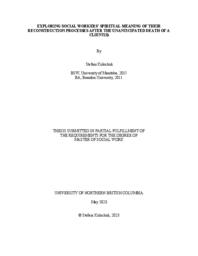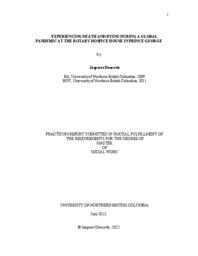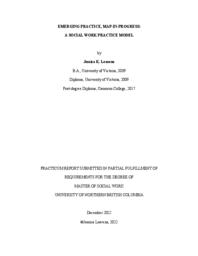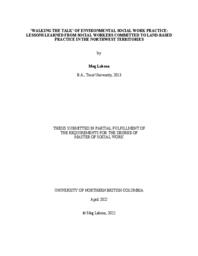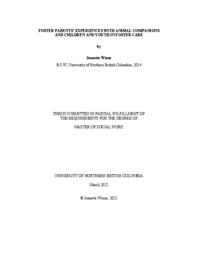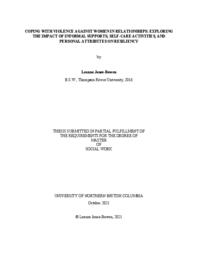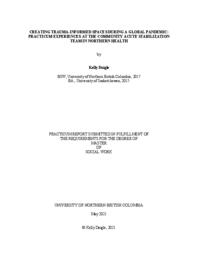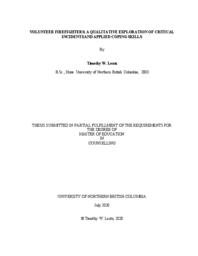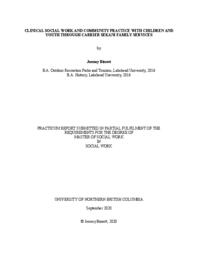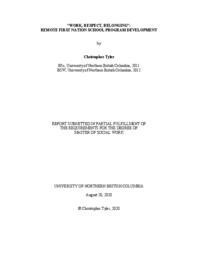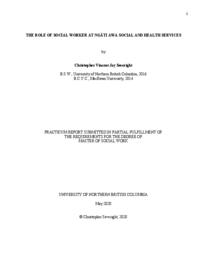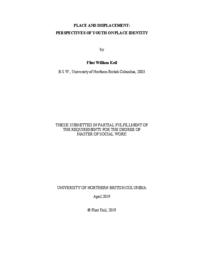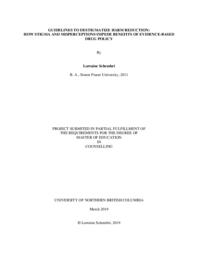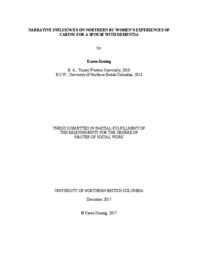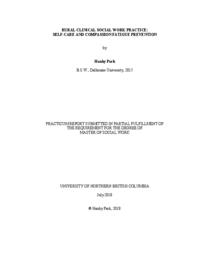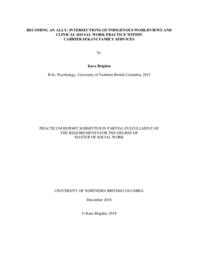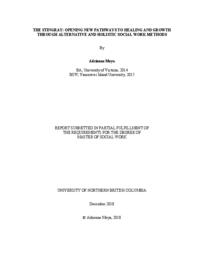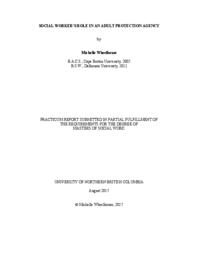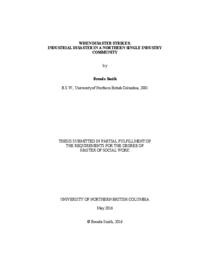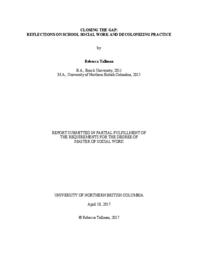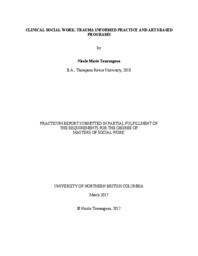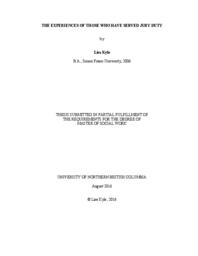Pierce, Joanna
Person Preferred Name
Joanna Pierce
Related Works
Content type
Digital Document
Description / Synopsis
Scholars have been calling for the integration of the natural environment within social work for over thirty years. However, the literature provides little insight into youth perspectives on their relationships with land and place, particularly in rural and remote communities. In fall 2022, I interviewed twelve students ages 14-17 at Fort St James Secondary School in BC’s Nechako Lakes District (School District 91) about their experiences spending time outdoors. By student choice, half of these interviews took place inside their school and half took place in outdoor settings nearby the school. Through reflexive thematic analysis, I developed five themes from our interviews, including (1) Specificity in relationships: Where we are (and who we are) matters; (2) Pathways to negotiating relationships with land and place; (3) Intersections of community, land, and youth resilience; (4) People are connected through place and time; and (5) Youth have agency and responsibility. My discussion links youth relationships with land and place to social work practice and highlights connections between the resilience of youth, their communities, and the land and water they rely on. This research contributes to a growing body of literature on social work and the environment and identifies future avenues for the integration of land and place within research.
Origin Information
Content type
Digital Document
Description / Synopsis
Background: This interpretive qualitative inquiry explores the spiritual meaning of their reconstruction processes of social workers after the unanticipated death of a client. Identifying existing social networks and using snowball sampling, ten social workers in British Columbia were recruited for this research. From a socially constructed and spiritual perspective, the researcher examines this process in collaboration with the ten participants. Through semistructured interviews the social work participants gave deep and rich personal stories reflecting on the experience of having a client unexpectedly die. Through a process of thematic analysis, four main themes, and nine sub-themes emerged from the data. Objective: To explore and gain a better understanding of social workers’ experiences of unanticipated client death and the spiritual meaning of their reconstruction processes after this experience. Methods: An interpretive qualitative inquiry was used for this study. A literature review was conducted to identity existing research and any gaps in research on the thesis question. Subsequently, semi-structured interviews were conducted with ten social worker participants who shared their experiences of unanticipated client death and spiritual meaning of their reconstruction processes. Thematic analysis of the data, guided by Braun and Clark (2018) was undertaken. Results: Three main themes and eight subthemes about how social workers experience and process the death of a client were found. Results revealed social workers often experience multiple client deaths that can be traumatic and have long lasting impacts/memories and that making sense of this experience is generally complex, unique to the individual, and meaning was found to be tied to systemic issues in the context of client death. A comparative analysis of Indigenous and non-Indigenous agencies in relation to spiritual supports are also presented. Conclusion: The experience of having a client death(s) is impactful and was found to be generally traumatic for social workers. Spirituality may play a part in how this experience is processed and understood. Systemic issues and current neoliberal systems were reported to be main factors in how death was understood in the context of worker-client relationship. Informal support in the workplace was perceived as essential and formal workplace supports were seen as ingenuine and challenging to access. Spiritual and culturally based supports naturally found within Indigenous culture were perceived as a welcome support, especially in the context of client bereavement. Finally, through this inquiry it was apparent there needs to be more research about the understudied impacts of experiencing the unanticipated death of a client, how social workers perceive, and access formal workplace supports, and how individual social workers and organizations draw from and utilize spirituality in social work practice.
Origin Information
Content type
Digital Document
Description / Synopsis
This practicum report is a summary of my experience at the Prince George Rotary Hospice House and a reflection upon the death and dying process during a global pandemic. Aspects of my practicum report are explored via a literature review, time spent at Hospice House and self-reflection on my personal and professional framework. My experience at Hospice House provided me the opportunity to witness death and dying in a home-like environment with full supportive care where the focus was always the guest and family. During this practicum I had the opportunity to wholeheartedly connect with people as they transition into another phase of life while I also supporting families during this difficult time. A common theme that provided comfort to the hospice care team was that perhaps the dying person was transitioning into a beautiful world where their family and friends await their arrival. The knowledge I gained from this practicum will continue to support my professional practice in acute care, where death and dying are predominate. As I continue my social work journey I am reminded of being open-hearted, being present in the moment with people as they are in pain, and acknowledged that being a part of someone’s dying journey is an honour.
Origin Information
Content type
Digital Document
Description / Synopsis
As social workers, we develop our own integrated social work theory and practice model to guide an ethical, accountable, and evidence-based approach to professional practice. This report describes my emerging model, a map-in-progress, developed over the course of my Master of Social Work degree and final practicum. My practice takes place in the territories of the Tla’amin Nation. In this report, I focus on social work in primary health care, grounded in a theoretical orientation of Just Practice, queer theory, and abolitionist theory. I describe four landmarks generated in the context of my practicum: i) interprofessional practice, ii) the clientpractitioner relational continuum, iii) equity-oriented health care, and iv) abolitionist social work. I present a series of process-oriented collages rooted in the tradition of arts-based inquiry as selfreflexive practice. This report serves as a tangible touchstone for my emerging practice and I offer it as a humble addition to social work scholarship and practice.
Origin Information
Content type
Digital Document
Description / Synopsis
The research presented in this thesis explored environmental social work; in particular, it responds to a gap in the literature regarding the lack of a clear practice model for social workers to follow, by focusing on how environmental social work is done. In order to offer an in-depth, qualitative look at what environmental social work can look like in practice and in specific places, I looked to self-identified social workers living and working in the Northwest Territories (NWT), Canada. The six social workers who responded to this call are all working in ways that integrate land, place, and the physical environment into their social work practice. Due to the impacts of the Covid-19 pandemic, the research was conducted entirely via distance using telephone, e-mail, and Zoom. Using a critical place inquiry approach and framed by theories of ecosystem approaches to health, grounded normativity, and relational validity, six in-depth interviews were conducted with social workers who shared their experiences of land-based practice in their personal and professional lives. Findings took the shape of five themes: ‘Lessons from the Land’, ‘Lessons in Ways of Being for Social Workers’, ‘Lessons from Being in Relationship’, ‘Lessons for our Workplaces and Profession’, and ‘Lessons in Practice’. The findings offer insight and practical examples for social workers seeking to connect their practice to the land; they also contribute practice wisdom to emerging discussions regarding both what can be done in environmental social work practice and how.
Origin Information
Content type
Digital Document
Description / Synopsis
This study describes the experiences of foster parents who have companion animals in their homes and the perceived impacts these animals have on children and youth in foster care. Six participants were interviewed regarding their experiences with animals in their home environment, their relationship with their foster children, and themselves, and the benefits and challenges of having a companion animal in the home. A qualitative, exploratory inquiry was conducted. Data analysis was completed using thematic analysis which revealed six central themes with 12 subthemes: (1) provision of companionship (subthemes include unconditional love); (2) strengthening of the foster home environment (environmental connection, increased feelings of safety); (3) teaching empathy (including responsibility and compassion); (4) emotional regulation (grief, emotional support, and calming presence); (5) benefits to foster parents (companionship, unconditional love, emotional support, additional support); (6) challenges. These findings have important implications for future social work practice and specific recommendations were created from the findings of this study.
Origin Information
Content type
Digital Document
Description / Synopsis
This thesis was conducted in the province of Alberta’s Edmonton Metropolitan Region (EMR) to identify the themes and variances among women’s informal methods of coping with and leaving abusive relationships, using a qualitative-exploratory approach. With the acknowledgment of feminist theory, the strengths-based perspective, and person-centred theory, this thesis explored women’s perspectives and their personal experiences of resiliency during and after leaving their abusive, male partners. Thematic analysis was used to code and analyze the data, which identified the following themes among the survivors: strong, informal support networks, engaging in self-care activities and self-improvement activities as a trauma response, and, the shared, personal attributes of self-preservation, resourcefulness, and self-reflection. Recommendations for theory, practice and further research are posed to the helping professions and informal support networks of survivors.
Origin Information
Content type
Digital Document
Description / Synopsis
During my social work practice with vulnerable populations, I have found that many clients and families I work with have experienced trauma in various forms. This is no less true in our current reality of concurrent health crisis: the opioid epidemic and the COVID-19 pandemic. My practicum at CAST provided me with numerous opportunities to observe, evaluate and provide trauma-informed practice through direct and indirect learning and training opportunities. My learning goals were to learn clinical practice skills for individual practice, to learn how to provide quality trauma-informed practice, and to develop a professional practice framework consistent with the British Columbia College of Social Workers (BCASW) Code of Ethics. This report discusses my practicum experiences, implications for personal practice such as the need for ongoing, effective self-care, and concludes with several recommendations for social work practice.
Origin Information
Content type
Digital Document
Description / Synopsis
Volunteer firefighters have limited up-to-date training and awareness in applied coping skills and trauma informed practice (TIP). Critical Incident Stress Management (CISM) has been a standard of practice within emergency services — including fire rescue services — for decades in Northern British Columbia. With new developments in TIP, I suggest we can further improve volunteer firefighters’ wellness by exploring specific coping strategies. The purpose of this endeavour was to interview volunteer firefighters, explore their experiences, and better understand their coping styles and approaches to managing stress related to the work. In the exploration of critical incident coping skills, a qualitative methodology and thematic analysis was applied. This study adds to the current literature on work-related coping, and hopefully increases awareness of best practices for psychological safety and wellness of volunteer firefighters in Northern British Columbia.
Origin Information
Content type
Digital Document
Description / Synopsis
In this report I weave the practical skills and knowledge I gained from my practicum with Carrier Sekani Family Services (CSFS) with theory related to child and youth mental health. I present human ecology as my grounding conceptual framework in my approach to wellness. I explore theoretical foundations for clinical social work, therapeutic modalities, rurality and cultural diversity through a literature review and build on these to support my practice experience. I include sections on youth mental health, Indigenous issues, ally-ship, trauma informed practice, attachment theory, connectedness, tele-mental health and rural social work practice. Services offered through Carrier Sekani’s counselling program that I have practiced include outreach, assessment, treatment planning, safety planning, referral and discharge. I connect practical experiences of working within Carrier culture as a mental health clinician to the literature and explore how I make sense of the shared and created knowledge.
Origin Information
Content type
Digital Document
Description / Synopsis
This report summarizes my practicum experience at Aatse Davie School in Fort Ware, British Columbia, on the traditional territory of the Kwadacha Nation. This K-12 school is located in one of the most remote areas in British Columbia and has approximately 100 students. I expanded and developed senior and junior boys’ groups, while also exploring program development as a social worker in a remote school location. My practicum firstly introduced electronics to these students as part of a STEM extracurricular activity and secondly explored areas of Indigenous masculinity. This report explores my practicum goals, accomplishments, and learnings, and then concludes with suggestions for future social workers and contributions to social work practice which emerged from my learning as part of my practicum experience.
Origin Information
Content type
Digital Document
Description / Synopsis
The intention of this practicum report is to provide a further understanding of the social worker’s role at Ngāti Awa Social and Health Services in Whakatāne, New Zealand. Ngāti Awa Social and Health Services provided me with a unique learning opportunity to explore the importance of a Māori framework within their programs on a rotational basis such as: Iwi Social Services, Rangiatea (i.e. Teen Parent Unit), and Te Waipuna Ariki o Matangireia ECE (i.e. Early Child Education). This report will provide an emphasis and understanding of the importance of incorporating Māori culture, and teachings within their agency framework at Ngāti Awa Social and Health Services. This practicum was a unique venture to be included as part of the Cross-Cultural Indigenous Knowledge Exchange (CCIKE) program. The practicum was only possible with multiple organizations coming together to consult, collaborate, and communicate. The following organizations were involved: University of Northern British Columbia (UNBC), UNBC First Nations Department, Te Whare Wānanga o Awanuiārangi, UNBC Master of Social Work program, and Queen Elizabeth II Diamond Jubilee Scholarship. This practicum opportunity represented the first collaboration with the Master of Social Work program and the Māori organizations. This experience allowed me to set specific learning goals in the following areas: professional practice, education development, cultural competency, cross-cultural experience, the ability to challenge oneself (i.e. out of my own comfort zone), and be an active participant in cultural events. This report will include a detailed description of the agency, theoretical frameworks/model, observations, research, critical reflection, hands-on experience, and an understanding of how Māori integrated programming improves health outcomes for Māori Whānau.
Origin Information
Content type
Digital Document
Origin Information
Content type
Digital Document
Origin Information
Content type
Digital Document
Origin Information
Content type
Digital Document
Origin Information
Content type
Digital Document
Origin Information
Content type
Digital Document
Origin Information
Content type
Digital Document
Origin Information
Content type
Digital Document
Origin Information
Content type
Digital Document
Origin Information
Content type
Digital Document
Origin Information
Content type
Digital Document
Origin Information


